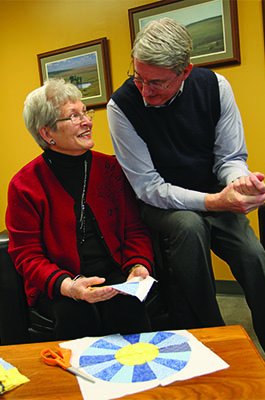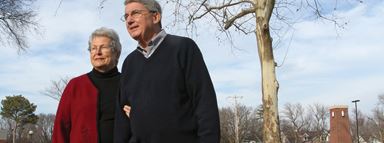When parents die, grief is not all that some people feel. Sometimes, there’s a fair bit of frustration too, when daughters and sons find out the details of mom and dad’s estate plan.
Ben and Sue Sprunger wanted their daughter and two sons to know what they have in mind for the future. Several family meetings later, the adult children were fully informed about their parents’ financial situation and how Ben and Sue plan to divide their estate.
“We talked with various people whose parents kept everything secret,” Ben said. “Others that we know have no idea what their parents’ wills or estates are or how they’re managing their estates. As parents age, frustrations set in for some children with questions unanswered, while for others, surprises and frustrations are acted out among siblings following funeral services. Silence creates a lot of frustration.”
Ben, who’s serving as interim president of Hesston (Kansas) College through June 2017, said he and Sue decided about 10 years ago that they not only desired but had a responsibility to minimize potential problems for their children when the elder Sprungers are gone.
Ben said, “We wanted our children to be adult participants with us in decision-making. If we do it together with them being fully informed, we hope to avoid hard feelings after we’re gone rather than leaving children with hurt feelings. We make decisions, and we share them with the children. The children will not have surprises.
“And secondly, if they are upset, frustrated or feel something’s been unfair, it’s our fault, not their siblings’ fault.” The goal, he said, is to leave the fewest problems for their children so “their relationships will remain healthy and strong and not be harmed by the estate and secrecy – things children have to guess at if they’re not part of the discussion.”
What’s the key to this whole process? “Start with the children,” Sue said.
The Sprungers’ experiences in talking things over with their sons and daughter are featured in the book, Necessary conversations between adult children and their aging parents, by Gerald and Marlene Kaufman. The Kaufmans, longtime family counselors, wrote the guide to encourage discussions about aging parents’ finances, medical care, living arrangements and other issues.
Some people don’t like to share information about their finances or what they want to see happen if they can’t care for themselves. Ben and Sue understand that. “It’s a difficult subject but not an impossible subject to talk about,” Ben said.
The Sprungers came from modest backgrounds. Ben’s father died when Ben was 4. Ben and Sue started with virtually nothing when they got married. They supported each other as they earned their university degrees.
“Like most young couples, we worked hard, lived carefully and made it on our own, but we were also blessed well beyond anything we ever expected,” Ben said. Early in their marriage, they agreed to always tithe and say “yes” to the church in whatever they were asked, including service.

“How do we give back to the Lord?” Ben said. “If the Lord has entrusted this with us and blessed us and we don’t own it, how do we give it back and not shortchange the children in the process?”
Ben is a former president of MEDA, an international economic development organization founded by Mennonite business professionals in 1953. He has worked in 51 countries and served on 23 national and international boards of directors.
Sue taught elementary school in Indiana and Michigan and later worked in the Worthington (Ohio) City School District as secretary to the director of elementary education and as school/financial secretary for Worthington Hills Elementary School.
Ben and Sue are members of Bahia Vista Mennonite Church, Sarasota, Florida, where Ben serves on the Board of Overseers. Nokomis, Florida, is their home base.
Like many parents, the Sprungers mostly kept their financial situation to themselves as their children were growing up, but around the age of 70, decided it was time to open the books.
Here’s a passage from Necessary Conversations:
Prior to our first meeting, we provided our children a confidential paper outlining what needed to be discussed. We provided a financial statement and a document outlining options for estate distribution. As might be expected, the children were surprised by the substance. We wanted to reduce their discomfort, so we were deliberately open and forthcoming.
The first topic Sue and Ben discussed was their death and burial plans, which were mostly in place. Then they talked about how various heirlooms and other physical assets could be distributed.
The parents talked about where they would live as they aged and who could take care of them if they become infirm. Because that wasn’t an immediate concern, they decided to revisit that issue later. Ben and Sue covered powers of attorney, living wills, executors and similar issues.
A second meeting took place about a year later, and Sue and Ben told their children about their plan to set up a charitable remainder trust, working with Everence®.
Their children will receive a percentage of the principal for 20 years, “which will come close to matching what they’d get if given the money outright,” Ben said. The remainder of the principal then will go into an endowed scholarship fund for students expressing a desire to enter Christian service and church leadership.
A third family meeting took place after pertinent documents were completed, and a fourth was an informal discussion and question-answering session.
“As might be expected, our children responded differently to our proposed plan for distribution of fiscal assets,” Ben said. “We talked it through in the family meeting and individually. We still have some discussions about it.” The real property – namely summer and winter homes and rental property – remains the substance of current family meetings.
For the Sprungers, the question of what to do with their assets isn’t a question at all. They believe what they have originated with God.
“If we’ve been blessed beyond our expectations, it’s not ours,” Ben said. “God gave it to us. We’re the caretakers.”

